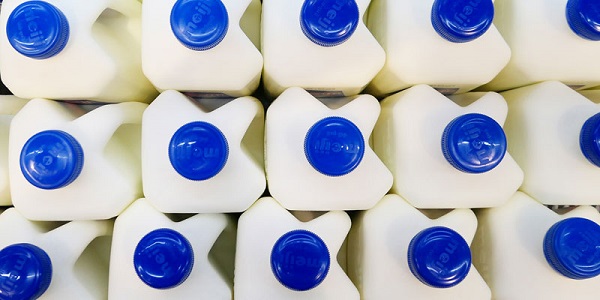Agriculture
Ottawa may soon pass ‘supply management’ law to effectively maintain inflated dairy prices

From the Fraser Institute
Many Canadians today face an unsettling reality. While Canada has long been known as a land of plenty, rising living costs and food insecurity are becoming increasingly common concerns. And a piece of federal legislation—which may soon become law—threatens to make the situation even worse.
According to Statistics Canada, rising prices are now “greatly affecting” nearly half of Canadians who are subsequently struggling to cover basic living costs. Even more alarming, 53 per cent are worried about feeding their families. For policymakers, few national priorities are more pressing than the ability of Canadians to feed themselves.
Between 2020 and 2023, food prices surged by 24 per cent, outpacing the overall inflation rate of 15 per cent. Over the past year, more than one million people visited Ontario food banks—a 25 per cent increase from the previous year.
Amid this crisis, a recent academic report highlighted an unforgivable waste. Since 2012, Canada’s dairy system has discarded 6.8 billion litres of milk—worth about $15 billion. This is not just mismanagement, it’s a policy failure. And inexcusably, the federal government knows how to address rising prices on key food staples but instead turns a blind eye.
Canada’s dairy sector operates under a “supply management” system that controls production through quotas and restricts imports via tariffs. Marketing boards work within this system to manage distribution and set the prices farmers receive. Together, these mechanisms effectively limit competition from both domestic and foreign producers.
This rigid regulated system suppresses competition and efficiency—both are essential for lower prices. Hardest hit are low-income Canadians as they spend a greater share of their income on essentials such as groceries. One estimate ranks Canada as having the sixth-highest milk prices worldwide.
The price gap between the United States and Canada for one litre of milk is around C$1.57. A simple calculation shows that if we could reduce the price gap by half, to $0.79, Canadians would save nearly $1.9 billion annually. And eliminating the price gap would save a family of four $360 a year. There would be further savings if the government also liberalized markets for other dairy products such as cheese, butter and yogurt. These lower costs would make a real difference for millions of Canadians.
Which brings us back to the legislation pending on Parliament Hill. Instead of addressing the high food costs, Ottawa is moving in the opposite direction. Bill C-282, sponsored by the Bloc Quebecois, has passed the House of Commons and is now before the Senate. If enacted, it would stop Canadian trade negotiators from letting other countries sell more supply-managed products in Canada as part of any future trade deal, effectively increasing protection for Canadian industries and creating another legal barrier to reform. While the governing Liberals hold ultimate responsibility for this bill, all parties to some degree support it.
Supply management is already causing trade friction. The U.S. and New Zealand have filed disputes (under the Canada-United States-Mexico Agreement and the Comprehensive and Progressive Agreement for Trans-Pacific Partnership) accusing Canada of failing to meet its commitments on dairy products. If Canada is found in violation, it could face tariffs or other trade restrictions in unrelated sectors. Dairy was also a sticking point in negotiations with the United Kingdom, leading the British to suspend talks on a free trade deal. The costs of defending supply management could ripple farther than agriculture, hurting other Canadian businesses and driving up consumer costs.
Dairy farmers, of course, have invested heavily in the system, and change could be financially painful. Industry groups including the Dairy Farmers of Canada carry significant political influence, especially in Ontario and Quebec, making it politically costly for any party to propose reforms. The concerns of farmers are valid and must be addressed—but they should not stand in the way of opening up these heavily regulated agricultural sectors. With reasonable financial assistance, a gradual transition could ease the burden. After all, New Zealand, with just 5 million people, managed to deregulate its dairy sector and now exports 95 per cent of its milk to 130 countries. There’s no reason Canada could not do something similar.
Bill C-282 is a flawed piece of legislation. Supply management already hurts the most vulnerable Canadians and is the root cause of two trade disputes that threaten harm to other Canadian industries. If passed, this law will further tie the government’s hands in negotiating future free trade agreements. So, who benefits from it? Certainly not Canadians struggling with food insecurity. The government’s refusal to modernize an outdated inefficient system forces Canadians to pay more for basic food staples. If we continue down this path, the economic damage could spread to other sectors, leaving Canadians to bear an ever-increasing financial burden.
Author:
Agriculture
Canada’s air quality among the best in the world

From the Fraser Institute
By Annika Segelhorst and Elmira Aliakbari
Canadians care about the environment and breathing clean air. In 2023, the share of Canadians concerned about the state of outdoor air quality was 7 in 10, according to survey results from Abacus Data. Yet Canada outperforms most comparable high-income countries on air quality, suggesting a gap between public perception and empirical reality. Overall, Canada ranks 8th for air quality among 31 high-income countries, according to our recent study published by the Fraser Institute.
A key determinant of air quality is the presence of tiny solid particles and liquid droplets floating in the air, known as particulates. The smallest of these particles, known as fine particulate matter, are especially hazardous, as they can penetrate deep into a person’s lungs, enter the blood stream and harm our health.
Exposure to fine particulate matter stems from both natural and human sources. Natural events such as wildfires, dust storms and volcanic eruptions can release particles into the air that can travel thousands of kilometres. Other sources of particulate pollution originate from human activities such as the combustion of fossil fuels in automobiles and during industrial processes.
The World Health Organization (WHO) and the Canadian Council of Ministers of the Environment (CCME) publish air quality guidelines related to health, which we used to measure and rank 31 high-income countries on air quality.
Using data from 2022 (the latest year of consistently available data), our study assessed air quality based on three measures related to particulate pollution: (1) average exposure, (2) share of the population at risk, and (3) estimated health impacts.
The first measure, average exposure, reflects the average level of outdoor particle pollution people are exposed to over a year. Among 31 high-income countries, Canadians had the 5th-lowest average exposure to particulate pollution.
Next, the study considered the proportion of each country’s population that experienced an annual average level of fine particle pollution greater than the WHO’s air quality guideline. Only 2 per cent of Canadians were exposed to fine particle pollution levels exceeding the WHO guideline for annual exposure, ranking 9th of 31 countries. In other words, 98 per cent of Canadians were not exposed to fine particulate pollution levels exceeding health guidelines.
Finally, the study reviewed estimates of illness and mortality associated with fine particle pollution in each country. Canada had the fifth-lowest estimated death and illness burden due to fine particle pollution.
Taken together, the results show that Canada stands out as a global leader on clean air, ranking 8th overall for air quality among high-income countries.
Canada’s record underscores both the progress made in achieving cleaner air and the quality of life our clean air supports.
Agriculture
Health Canada pauses plan to sell unlabeled cloned meat

From LifeSiteNews
Health Canada has indefinitely paused its plan to allow unlabeled cloned meat in grocery stores after thousands of Canadians, prominent figures, and industry leaders condemned the move.
Health Canada is pausing its plan to put unlabeled cloned meat in Canadian grocery stores, following public outcry.
In a November 19 update on its website, Health Canada announced an indefinite suspension of the decision to remove labels from cloned meat products after thousands of Canadians condemned the plan online.
“The Government of Canada has received significant input from both consumers and industry about the implications of this potential policy update,” the publication read. “The Department has therefore indefinitely paused the policy update to provide time for further discussions and consideration,” it continued, adding, “Until the policy is updated, foods made from cloned cattle and swine will remain subject to the novel food assessment.”
In late October, Health Canada quietly approved removing labels from foods derived from somatic cell nuclear transfer (SCNT) clones and their offspring. As a result, Canadians buying meat from the grocery store would have had no way of knowing if the product was cloned meat.
Many researchers have documented high rates of cloning failure, large offspring syndrome (LOS), placental abnormalities, early death, and organ defects in cloned animals. The animals are also administered heavy doses of antibiotics due to infections and immune issues.
Typically, the offspring of cloned animals, rather than the cloned animals themselves, are processed for human consumption. As a result, researchers allege that the health defects and high drug use does not affect the final product.
However, there are no comprehensive human studies on the effects of eating cloned meat, meaning that the side-effects for humans are unknown.
News of the plan spread quickly on social media, with thousands of Canadians condemning the plan and promising to switch to local meat providers.
“By authorizing the sale of meat from cloned animals without mandatory labeling or a formal public announcement, Health Canada risks repeating a familiar and costly failure in risk communication. Deeply disappointing,” food policy expert and professor at Dalhousie University Sylvain Charlebois wrote on X.
"By authorizing the sale of meat from cloned animals without mandatory labeling or a formal public announcement, Health Canada risks repeating a familiar and costly failure in risk communication. Deeply disappointing."
More on this week's Food Professor Podcast! https://t.co/UZTIcQzUN3
— The Food Professor (@FoodProfessor) October 30, 2025
Likewise, Conservative MP Leslyn Lewis warned, “Health Canada recently decided that meat from cloned animals and their offspring no longer needs a special review or any form of disclosure.”
“That means, soon you could buy beef or pork and have no idea how it was bred,” she continued. “Other countries debate this openly: the EU has considered strict labelling, and even the U.S. has admitted that cloned-offspring meat is circulating.”
“But here in Canada, the public wasn’t even told. This is about informed choice,” Lewis declared. “If government and industry don’t have to tell us when meat comes from cloned animals, then Canadians need to ask a simple, honest question: What else are we not being told?”
Health Canada recently decided that meat from cloned animals and their offspring no longer needs a special review or any form of disclosure. That means, soon you could buy beef or pork and have no idea how it was bred.
Other countries debate this openly: the EU has considered… pic.twitter.com/zCnqJOpvf3
— Dr. Leslyn Lewis (@LeslynLewis) November 14, 2025
Likewise, duBreton, a leading North American supplier of organic pork based out of Quebec, denounced the move, saying, “Canadians expect clarity, transparency, and meaningful consultation on issues that directly touch their food supply. As producers, we consider it our responsibility and believe our governing food authorities should too.”
According to a survey conducted by duBreton, 74 percent of Canadians believe that “cloned meat and genetic editing practices have no place in farm and food systems.”
-

 COVID-192 days ago
COVID-192 days agoUniversity of Colorado will pay $10 million to staff, students for trying to force them to take COVID shots
-

 Bruce Dowbiggin2 days ago
Bruce Dowbiggin2 days agoIntegration Or Indignation: Whose Strategy Worked Best Against Trump?
-

 espionage2 days ago
espionage2 days agoWestern Campuses Help Build China’s Digital Dragnet With U.S. Tax Funds, Study Warns
-

 Bruce Dowbiggin2 days ago
Bruce Dowbiggin2 days agoWayne Gretzky’s Terrible, Awful Week.. And Soccer/ Football.
-

 Agriculture2 days ago
Agriculture2 days agoCanada’s air quality among the best in the world
-

 Business2 days ago
Business2 days agoCanada invests $34 million in Chinese drones now considered to be ‘high security risks’
-

 Health2 days ago
Health2 days agoCDC Vaccine Panel Votes to End Universal Hep B Vaccine for Newborns
-

 Business2 days ago
Business2 days agoThe EU Insists Its X Fine Isn’t About Censorship. Here’s Why It Is.









